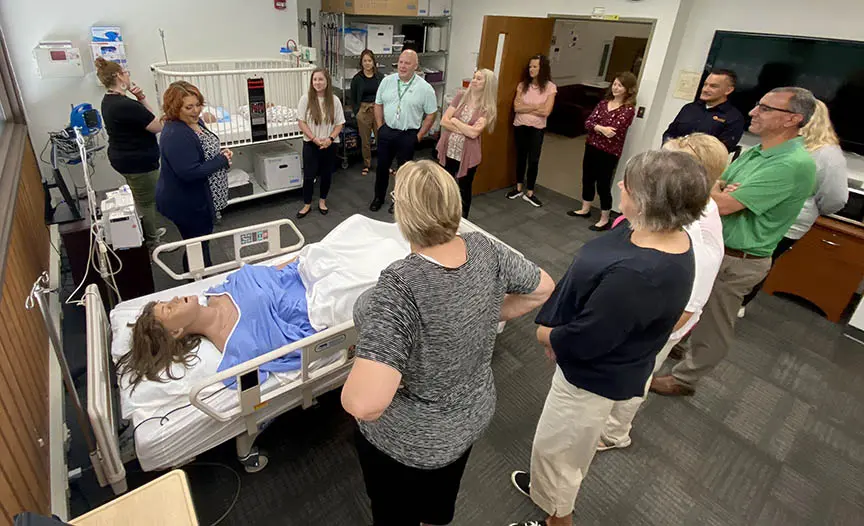

UWSP, Rhinelander School District Staff Visit Nicolet to Create More Educational Pathways for Students
Smooth pathways from high school to college to careers don’t happen by magic.
To do it right – ensuring students experience an easy and seamless transitions from one stage to the next – takes considerable work behind the scenes.
That’s exactly what took place recently when a contingent of staff from University of Wisconsin-Stevens Point and the School District of Rhinelander met with their academic counterparts at Nicolet College to facilitate a smooth pathway through the three partner institutions.
“At its core, it all starts with effective communication between all parties involved,” said Sarah Gruber, Nicolet College dual credit coordinator, who was part of the hosting team.
“You can send emails, you can have phone calls, but there really is no better way to build these pathways than to meet in person, see the facilities, and understand each institution’s processes. This gives everyone that very valuable first-hand knowledge that we can then accurately communicate with students interested in proceeding down any given pathway.”
The most recent collaborative visit focused on expanding pathways for students interested in careers in health care and education, both being fields of special need throughout the state, and especially in northern Wisconsin. Having previously seen UWSP’s facilities and their role in the process, the partners toured Nicolet’s Health Occupations and Early Childhood Education labs and classrooms.
The working scenario would entail students taking career-preparatory coursework across the partner institutions. Starting right away in high school, students could take dual credit courses that count toward high school graduation but also earn college credit. Then, at Nicolet, students could take further coursework toward a degree or professional credential. Finally, students moving on to UWSP would enter as upperclassmen, taking upper-level courses in a major and ultimately earning a bachelor’s degree.
The visit also included discussion of providing students some experiences outside of the classroom in order to learn more about the training necessary for careers in these fields and also what it is like to work in these professions after they graduate.
“There are some 17- and 18-year-olds who know exactly what they want to do for their careers, but those students are definitely in the minority,” said Gruber, who has worked with many hundreds of young adults in her seven years at Nicolet.
“It’s much more common for these individuals to have an area of general career interest, like healthcare or education, but they are just not ready to make a firm commitment to a specific job within the field, which is perfectly understandable. We want them to make the right decision the first time and not decide to change course a couple years and many thousands of dollars later.”
At the end of the visit, all parties involved expressed excitement at the possibilities that these refined pathways would create for students and committed to another meeting this fall to add further details to the concept, explained Gruber. She also stressed that this work is a pilot partnership that will be learned from and eventually offered to other high school students in the area.